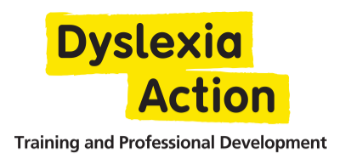

 Site Navigation
Site Navigation

This new Level 7 Certificate can be studied as a stand-alone Postgraduate Certificate (60 masters credits) or combined with modules offered by our sister company Real Training to achieve a Postgraduate Diploma or Master of Education on the SEND & Inclusion or the Inclusive Educational Leadership programme.

The Certificate was developed and is delivered and assessed by Dyslexia Action, awarded and quality assured by Middlesex University. The courses are modular and flexible and are undertaken part-time, through our virtual learning platform Campus Online. Access is available 24/7, from anywhere in the world with an internet connection. The Certificate is suitable for those working with primary or secondary age groups, or for those supporting adults.
The Certificate enables delegates to develop critical thinking skills, reflective practice and disciplined enquiry through study of the theory and practice associated with the teaching and non-standardised appraisal of learners with Maths-Related difficulties.
In order to achieve the Certificate, you will have to complete the following modules:
*Please note, the title of this module is subject to approval.
Please note:
The first module, Mathematical Understanding and Teaching Methods, runs three times a year, with start dates on 15 Jan, 15 May, and 15 September.
The second module, Maths Teaching and Intervention Planning, is offered twice a year, beginning on 15 September and 15 Jan.
For this reason, we recommend the following study schedules to best accommodate the teaching practicum:
| Mathematical Understanding and Teaching Methods | Maths Teaching and Intervention Planning* | |
| PGCert study option 1 | Start 15 January | Start 15 September |
| PGCert study option 2 | Start 15 May | Start 15 Jan |
| PGCert study option 3 | Start 15 September | Start 15 September (the following year) |
Delegates completing this Certificate will have knowledge and understanding of:
And the skills to:
DAPP22-01 Mathematical Understanding and Teaching Methods – Underpinning Theory
 Typical and atypical development of maths skills – factors affecting development.
Typical and atypical development of maths skills – factors affecting development.DAPP02-02 Maths Teaching and Intervention Planning*
For further information including eligibility and how to apply please visit the individual modules pages on the Real Training website.
This Postgraduate Certificate and the modules within are awarded and quality assured by Middlesex University.
If you are interested in any of the accreditations/membership levels below you may need further training in addition to this Certificate in Maths – please contact The Dyslexia Guild at guild@dyslexiaaction.org.uk for further information.

Between 3-7% of children are thought to have maths difficulties, including dyscalculia. As we learn more about how and why these problems arise – could the way we are teaching maths at both primary and secondary levels be an exacerbating factor?
In this blog we take a look at the latest research behind the genetic, psychological and social drivers behind maths difficulties, as well as the role of current teaching approaches. We challenge some assumptions about what it really takes to be good at maths and explain why it’s important to explore alternative routes to understanding when children are struggling.
View the full article by Real Training here